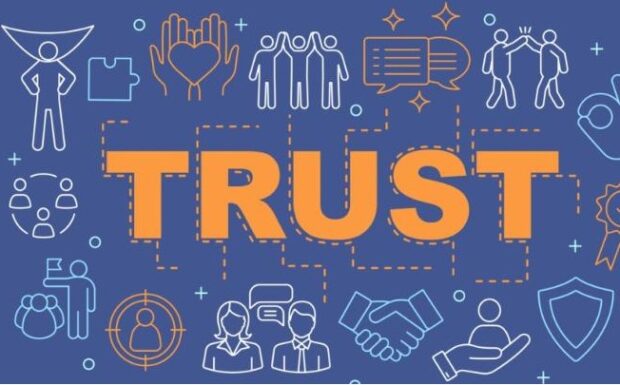Trust is a fundamental cornerstone when building any relationship. It serves as the bedrock upon which connections are built, nurtured, and strengthened. It is not simply a component but the very fabric that holds relationships together. Building trust requires time, effort, understanding, and, most importantly, communication.
Understanding Trust
Trust can be seen as a deeply embedded belief in the reliability, truth, and strength of a person. It is about having the confidence that the other party will act in ways that are beneficial to the relationship. There is no shortcut to trust; it’s an ongoing process that requires patience and consistency.
The Process of Building Trust

Communication
Clear and open communication is the key to building trust. Honest conversation about feelings, thoughts, and expectations eliminates misunderstanding and strengthens the bond. By expressing oneself openly, a deeper level of intimacy is fostered, paving the way for trust.
Honesty and Integrity
Honesty and integrity are crucial. Always say what you mean and mean what you say. Your actions and words should align. Being reliable in this way enhances trustworthiness, making it easier for others to believe in you.
Consistency
Being consistent is a critical part of building trust. Displaying consistent behavior over time shows others that they can rely on you. Consistency is about being stable, predictable, and dependable, which are all qualities that strengthen trust.
Empathy
Empathy means understanding and sharing the feelings of another. Demonstrating empathy shows that you respect and value the other person’s feelings, thoughts, and experiences. This validation builds trust because it indicates a deep level of emotional connection and understanding.
Respect and Understanding
Respect and understanding are important elements in fostering trust. By respecting the boundaries, feelings, and opinions of others, you are showing that you value their individuality and personal space. Similarly, understanding their perspectives, even when they differ from yours, can cultivate a sense of trust.
How to Maintain Trust

Building trust is one thing, but maintaining it requires continuous effort. It involves persistently exhibiting the same traits that helped build trust initially. You need to keep communicating, remain honest, continue being empathetic, and constantly respect and understand the other party.
The Role of Trust in Different Relationships
Trust plays a crucial role in various relationships, including romantic relationships, friendships, and even professional connections. Interestingly, the significance of trust extends even to relationships that are outside the conventional framework. For instance, building trust in a sugar daddy relationship is as important as in any other relationship. Regardless of the context, trust remains a consistent and significant aspect.
Trust and Conflict Resolution
Trust plays a substantial role in conflict resolution. In a relationship where trust has been cultivated, conflicts become easier to navigate. Disagreements can be discussed openly and respectfully, leading to compromises and solutions that benefit the relationship rather than tearing it apart.
The Impact of Breaching Trust

A breach of trust can cause severe damage to a relationship. This might be due to a lie, a betrayal, or any act that goes against the expectations set within the relationship. Such instances can lead to a loss of confidence in the person who breached the trust, and rebuilding it can be a difficult task.
Rebuilding Trust
Rebuilding trust requires a greater effort than building it in the first place. It involves acknowledgment of the breach, sincere apology, and consistent effort to mend the damage. The process is time-consuming and might involve several steps back before any significant progress is made. However, with mutual effort and commitment, it is possible to repair the broken trust.
Trust and Personal Growth
Trust is not only about fostering better relationships but also plays a critical role in personal growth. By trusting others, we learn to be vulnerable, to share our true selves, and to engage with others in a deep and meaningful way. We learn to appreciate the value of honesty, integrity, and consistency, traits that are beneficial in all aspects of life.
In a trusting relationship, there is a safe space to express thoughts, feelings, and ideas without fear of judgment or ridicule. This freedom promotes personal growth as individuals feel comfortable exploring their identities and expressing their uniqueness.
Trust can also inspire us to become better people. By striving to be someone others can trust, we cultivate qualities such as honesty, reliability, and empathy, leading to personal growth and development. Moreover, the experience of being trusted can boost self-esteem and self-confidence, further contributing to personal growth.
The Societal Impact of Trust

Beyond individual relationships, trust plays a significant role in society. Trust is the foundation of any community, influencing social interactions and contributing to social cohesion. A society that exhibits a high level of trust is likely to have stronger social bonds, better cooperation, and more effective communication.
In social contexts, trust helps in the formation of social networks, encouraging cooperation, and fostering a sense of community. It allows for the smooth functioning of social systems and is a prerequisite for social order. Without trust, societal interactions would be fraught with uncertainty and anxiety.
Moreover, trust in institutions such as the government, the legal system, and the media is crucial for a functioning society. This form of trust, often referred to as institutional trust, promotes a sense of security, order, and predictability, essential for social stability.
Conclusion
Trust is an intricate web connecting individuals and societies alike. Its influence stretches beyond the boundaries of personal relationships, seeping into societal structures and shaping them profoundly. From personal development to societal cohesion, trust is a fundamental element that holds immense power. By nurturing trust in our relationships, we are indirectly contributing to a more connected, understanding, and cooperative world.




























